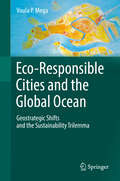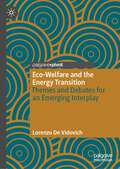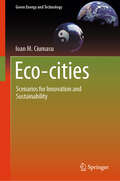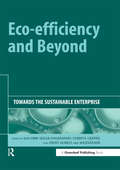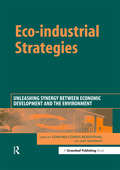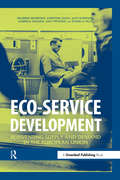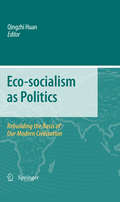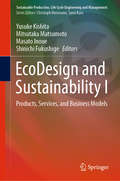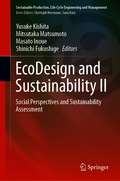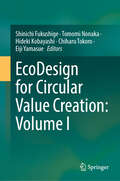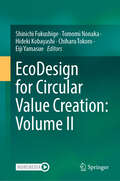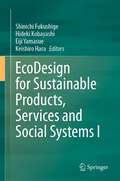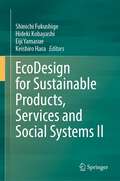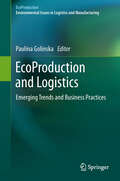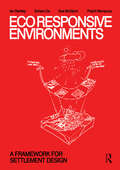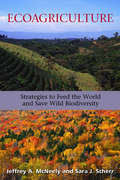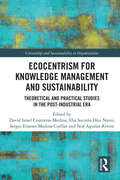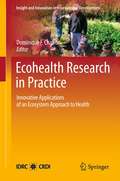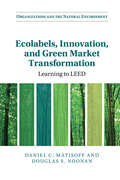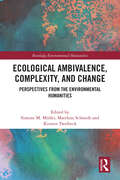- Table View
- List View
Eco-Responsible Cities and the Global Ocean: Geostrategic Shifts And The Sustainability Trilema
by Voula P. MegaThis book examines the nexus of cities and oceans and the interrelations between the Sustainable Development Goals (SDGs) 11 and 14, just after the first two critical years following the milestone year of hope in 2015. It advocates for actions both for sustainable cities, the largest interconnected and only human ecosystem, and for the global ocean that is the largest physical ecosystem. Cutting-edge concepts and actions are presented by and for cities and oceans, following the global engagements during the years 2015-2017. In the era of global geopolitics, cities offer major democratic spaces between the micro-regulations of the local communities and the governance of the global commons. The role of education, trust, and citizen empowerment cannot be stressed enough. This book offers an evidence-based, holistic and integrated view of key urban and ocean sustainability issues at the horizon of 2030 and of 2050. The chapters cover the most prominent issues at the heart of the matter, and highlight systemic multi-stakeholder eco-responses towards sustainability with economic, social, environmental dimensions, including political and cultural aspects. This book offers a full exploration of cities and seas with an emphasis on vigorous paradigm shifts, redesigning human systems, and reconciling them with nature. Building on robust evidence, and transformational cases, it provides structured advice for world leaders, stakeholders and scholars.
Eco-Welfare and the Energy Transition: Themes and Debates for an Emerging Interplay
by Lorenzo De VidovichThis book provides a comprehensive overview of the emerging interplay that runs between energy – seen as a basic need and a providential material service from the viewpoint of welfare studies – and eco-welfare, seen as an emerging analytical and policy paradigm that hold together the social crisis on the one hand, and the ecological crisis, on the other hand. At a time of energy transition, the interplay between the theoretical framework of eco-welfare and the topic of energy supply is little explored, and therefore, this book fills a need in the literature by providing a comprehensive framework to navigate this emerging relationship. Such a framework is strengthened by insights on energy poverty and renewable energy communities, identified as cornerstones of the analysis between energy transition and eco-welfare.
Eco-cities: Scenarios for Innovation and Sustainability (Green Energy and Technology)
by Ioan M. CiumasuThis book explores the question of how urban sustainability can be achieved despite a lack of knowledge integration between different fields. This book starts from the premise that the battle for sustainability will be won or lost in cities and proposes a critical, up-to-date review of transdisciplinary knowledge management tools – notably, scenario methods for informed decision-making. Drawing from literature and pioneering experience in innovation clusters (university-industry-government) during the last decade, it provides a review of recent eco-city concepts and knowledge management tools for effective decision-making in the transition to urban sustainability. Using method outlines, case studies, and graphical representations, it is intended to serve as a toolbox for those interested in urban transformation towards sustainability.The challenge of sustainability is unprecedented in the history of humanity. The world population is already predominantly urban, andthe biosphere is profoundly transformed in ways which we can only partially understand, let alone manage. For example, the Intergovernmental Panel for Climate Change has produced very impressive sets of global climate scenarios, but the consequences for real-world management remain marginal.This book is intended for city managers concerned with urban transformation towards sustainability, policymakers, researchers-innovators, and technology developers, industry and business professionals, as well as students and the general public.
Eco-efficiency and Beyond: Towards the Sustainable Enterprise
by Jan-Dirk Seiler-Hausmann Christa Liedtke Ernst Ulrich Von WeizsäckerBusiness-as-usual, it is widely accepted, will exceed the Earth's carrying capacity in an alarmingly short space of time. In simple terms, we need to learn to use the world's rapidly depleting resources in a significantly more efficient manner. Practical and readily adopted solutions are needed now. Eco-efficiency-or "produce more with less" – is achieved when goods and services satisfy human needs, increase the quality of life at competitive prices and when environmental impacts and resource intensity are decreased to a degree that keeps them within the limits of Earth's expected carrying capacity. Eco-efficiency – a term first proposed by the World Business Council for Sustainable Development in 1992 – is a management approach that allows businesses to carry out environmental protection measures from a market-oriented point of view, with the aim of illustrating that ecology and the economy do not need to be a contradiction. Indeed, eco-efficiency has been portrayed as a win-win-for both business and the environment. This book, which developed out of two conferences on eco-efficiency held in Düsseldorf in 1998 and 2001, is edited by Ernst Ulrich von Weizsäcker and his team from the Wuppertal Institute for Climate, Environment and Energy, one of the world's leading research programmes on resource productivity. The aim is not simply to explain the past and present of eco-efficiency but to look forward to and encourage a future where the comprehensive take-up of the concept by business, government and consumers could lead to innovation on a grand scale and the possibility of a giant leap beyond towards overall sustainability. There have been considerable achievements to date. The Dow Jones Sustainability Index, which aims to list the most sustainable corporations for investors, includes companies such as BASF, Climatex, Henkel and Matushita/Panasonic (all represented in this book), who are implementing eco-efficiency measures. A number of political initiatives have also been formed. In December 2001, the German government suggested a National Sustainability Strategy to measure Germany's sustainable development. While this not yet an accepted political target or even law, it shows that politics is moving toward binding targets for increasing efficiency. Eco-Efficiency and Beyond collects together the leading thinkers on the topic and aims to illustrate not only that the concept should be part of every business strategy but that it is a key trigger for innovation. Innovation cuts through paradoxes. It is the creation of solutions to conflicting demands. Flying in a vacuum gave us rockets and satellites; switching electrons through insulators gave us Silicon Valley and the digital age. Sustainable development presents a similar field of paradoxical innovation forces: i.e. provide affordable products and services for the growing unmet needs of the world population while reducing environmental impacts. This book is the definitive collection on eco-efficiency and will be required reading for business, government, NGOs and academicians.
Eco-industrial Strategies: Unleashing Synergy between Economic Development and the Environment
by Judy MusnikowEco-industrial development is born from the realisation that the places where we work waste too much and unnecessarily pollute the land, air and water. This book explores the key issues involved in developing eco-parks and identifies the stakeholders and their roles in such projects.
Eco-resorts
by Zbigniew BromberekEco-Resorts is a design guide for low impact, environmentally friendly tourist resorts in the tropics. The book is the first to offer architects practical, detailed guidance in developing resort buildings that work with a tropical climate andmeet the needs and expectations of the client and building inhabitants. The book includes both architectural design and material solutions, supported by theoretical principles, to present asustainable approach to resort design. It demonstrates that tropical resort buildings do not necessarily require largeenergy input, in compliance with green building standards. Case studies show how principles of sustainable designhave been successfully applied in tropical environments. * Written by an industry insider with practical design experience, knowledge and expertise.* Demonstrates design practices related to site planning and layout, and re-assesses best practices for a tropicalenvironment, allowing architects to apply design principles to their own projects.* Includes international case studies from several countries to illustrate best practice from a variety of tropical climate destinations around the world. Z (Zbigniew) Bromberek, PhD, is an architect educated and registered in Poland, and postgraduate-educated and residing in Australia. Z has been practising and teaching architecture for nearly 30 years. He has been involved and associated with various educational institutions and professional organizations in a number of countries around the world. Before the current appointment as Senior Lecturer in Architecture at the University of Tasmania, Z spent three years as Lecturer in Environmental Design at the University of Queensland, and two years as Guest Professor in Architectural Design in Nanjing, PR China. He was also the President of the Architectural Science Association ANZAScA for three consecutive terms in 2000–05. Z’s major research interests include design–environment interaction, low-impact architecture and re-integration of architecture as an expression of a multi-disciplinary approach to design.
Eco-service Development: Reinventing Supply and Demand in the European Union
by Siegfried Behrendt Christine Jasch Jaap Kortman Gabriele Hrauda Ralf Pfitzner Daniela VelteSustainable development will not be possible without fundamental improvements in resource productivity and energy efficiency, the adaptation of material flows into natural cycles as well as a radical change in production and consumption patterns. In essence, what is required is not only an ecological approach to product design but also new marketing and consumption patterns for products that can satisfy our needs in a more environmentally sound way.In recent years there has been growing interest in the possibilities of eco-services to achieve some of these aims. Ecologically oriented leasing, renting, pooling and sharing, where the emphasis is placed on the sale of a product's use rather than on the product itself, offer great possibilities for innovation and environmental impact reduction. At the same time, there are opportunities to create new commercial enterprises, produce added value to production and distribution functions, and therefore create jobs. Up until now, however, there has been little research about the state of the art in eco-services, how new services can be developed, what the attitudes of consumers are to services rather than products and what the consequences of such a structural adjustment would be for firms. Eco-service Development addresses this lack of research, first by providing a comprehensive inventory and analysis of current eco-services in four European countries: Germany, Austria, the Netherlands and Spain. It then systematically explores the options open to market participants, the potential for environmental impact reduction, potential barriers to eco-services (such as consumer and producer resistance) and, finally, with what political and legal instruments ecologically oriented services can best be promoted. The book analyzes eight consumer sectors – washing, cleaning, cooking, entertainment, gardening, do-it-yourself, mobility and leisure time – from the point of view of both supply and demand and highlights the optimization potential and development perspectives for commercial new use eco-service concepts. This book is the most comprehensive analysis yet published of how eco-services are being implemented and how they could best be encouraged and contains valuable lessons for policy-makers, interested businesses and all those in the academic community searching for ways to dematerialize the economy.
Eco-socialism as Politics: Rebuilding the Basis of Our Modern Civilisation
by Qingzhi HuanThis volume consists of analyses by experts from both the West and the East on the up-to-date development of Eco-socialism as a red-green politics within the context of capitalist globalisation. It investigates whether and/or in what sense Eco-socialism can offer a better explanation to the causes of ecological problems than the other Green discourses - such as deep ecology and ecological modernisation theory, and thus has more contributions to make in dealing with the deteriorating ecological crisis throughout the world.
Eco7: Launching a New Motor Oil
by John A. Quelch Sunru YongAaron Jonnerson, vice president of marketing at the automotive division of Avellin, must make marketing mix decisions for the launch of Eco7, a new environmentally-friendly motor oil. The company's performance has been mediocre, shareholder pressure is increasing, and expectations are high for Eco7. However, Jonnerson faces significant challenges in ensuring a successful launch. The market for passenger car motor oil (PCMO) is mature and consumers are price-sensitive. Furthermore, the independent oil change outlets that are Avellin's core customers have declined relative to other channels. Jonnerson must design the best pricing strategy to ensure a successful launch. The Eco7 case asks students to examine consumer behavior and channel conflict and factor them into a product launch. The launch comes at a time when the company may need to adapt to changes in a market that is increasingly commoditized and in which the relative importance of different distribution channels is changing. Students are asked to make recommendations on pricing and distribution and to consider which trade-offs the company should make.
EcoDesign and Sustainability I: Products, Services, and Business Models (Sustainable Production, Life Cycle Engineering and Management)
by Mitsutaka Matsumoto Shinichi Fukushige Yusuke Kishita Masato InoueThis book highlights cutting-edge ecodesign research, covering product and service design, smart manufacturing, and social perspectives in ecodesign. Featuring selected papers presented at EcoDesign 2019: 11th International Symposium on Environmentally Conscious Design and Inverse Manufacturing, it also includes diverse, interdisciplinary approaches to foster ecodesign research and activities. In the context of Sustainable Development Goals (SDGs), it addresses the need for the manufacturing industry to design innovations for sustainable value creation, taking into account technological developments, legislation, and consumer lifestyles. Further, the book discusses the concept of circular economy, which originated in Europe and aims to increase resource efficiency by shifting away from the linear economy. Focusing on product life cycle design and management, smart manufacturing, circular economy, and business strategies, and providing useful approaches and solutions to these emerging concepts, this book is intended for both researchers and practitioners working in the broad field of ecodesign and sustainability.
EcoDesign and Sustainability II: Social Perspectives and Sustainability Assessment (Sustainable Production, Life Cycle Engineering and Management)
by Mitsutaka Matsumoto Shinichi Fukushige Yusuke Kishita Masato InoueThis book highlights cutting-edge ecodesign research, covering product and service design, smart manufacturing, and social perspectives in ecodesign. Featuring selected papers presented at EcoDesign 2019: 11th International Symposium on Environmentally Conscious Design and Inverse Manufacturing, it also includes diverse, interdisciplinary approaches to foster ecodesign research and activities. In the context of Sustainable Development Goals (SDGs), it addresses the need for the manufacturing industry to design innovations for sustainable value creation, taking into account technological developments, legislation, and consumer lifestyles. Further, the book discusses the concept of circular economy, which originated in Europe and aims to increase resource efficiency by shifting away from the linear economy.Focusing on product life cycle design and management, smart manufacturing, circular economy, and business strategies, and providing useful approaches and solutions to these emerging concepts, this book is intended for both researchers and practitioners working in the broad field of ecodesign and sustainability.
EcoDesign for Circular Value Creation: Volume I
by Shinichi Fukushige Tomomi Nonaka Hideki Kobayashi Eiji Yamasue Chiharu TokoroThis 2-volume book sheds new light on the forefront of ecodesign research, encompassing product and service design, smart manufacturing, and social perspectives. Featuring selected papers from EcoDesign 2023: 13th International Symposium on Environmentally Conscious Design and Inverse Manufacturing, it offers interdisciplinary approaches to foster sustainable innovations. Within the framework of the Sustainable Development Goals (SDGs), it underscores the necessity for the manufacturing sector to innovate for sustainable value creation, taking into account technological advancements, regulatory requirements, and consumer behavior. Additionally, it explores the concept of the circular economy, which originated in Europe and seeks to enhance resource efficiency by transitioning from a linear to a circular economic model. This book aims to unite professionals across the globe who are dedicated to advancing the field of ecodesign, and facilitating the exchange of knowledge across various disciplines and communities. The first volume highlights the product life cycle design and management, sustainability assessment for ecoDesign, and circular economy. Readers will delve into the environmentally conscious design of products and services, life cycle management, sustainable manufacturing, EoL management and process technologies, green supply chain management, life cycle evaluation, and sustainability indices. Contributions from renowned scholars provide critical insights into ecodesign regulations compliance processes like EPD certifications; consumer behavior towards eco-labels; innovative business models for sustainability; participatory approaches for ESG initiatives; digital twins for real-time life cycle assessment; AI techniques supporting wastewater treatment; among others.
EcoDesign for Circular Value Creation: Volume II
by Shinichi Fukushige Tomomi Nonaka Hideki Kobayashi Eiji Yamasue Chiharu TokoroThis 2-volume book highlights cutting-edge ecodesign research, encompassing product and service design, smart manufacturing, and social perspectives. Featuring selected papers from EcoDesign 2023: 13th International Symposium on Environmentally Conscious Design and Inverse Manufacturing, it offers interdisciplinary approaches to foster sustainable innovations. Within the framework of the Sustainable Development Goals (SDGs), it underscores the necessity for the manufacturing sector to innovate for sustainable value creation, taking into account technological advancements, regulatory requirements, and consumer behavior. Additionally, it explores the concept of the circular economy, which originated in Europe and seeks to enhance resource efficiency by transitioning from a linear to a circular economic model. This book aims to unite professionals across the globe who are dedicated to advancing the field of ecodesign, and facilitating the exchange of knowledge across various disciplines and communities. The second volume highlights sustainable technology, social perspectives in ecodesign, and business strategy. The chapters cover digital and AI technologies for sustainability, sustainable social infrastructure, smart manufacturing, sustainable consumption and production, policy, legislation and social activities, finance and investment for sustainability, green business, and engineering economics. Readers will discover diverse perspectives from expert contributors who delve into critical issues like climate change education in primary schools in Vietnam; food security in Japan; repurposing lithium-ion batteries; carbon neutrality through sensor-based smart city services; life cycle assessments of automotive parts; human health risks from chemicals in export products; and developing high-resolution spatial global biodiversity damage factors. This collection invites readers to think through critical questions about resource efficiency and the shift from a linear to a circular economy. Researchers in the fields of sustainable design, environmental engineering, policy-making, and business strategy will find this book invaluable.
EcoDesign for Sustainable Products, Services and Social Systems I
by Shinichi Fukushige Hideki Kobayashi Eiji Yamasue Keishiro HaraThis 2-volume book highlights cutting-edge ecodesign research and covers broad areas ranging from individual product and service design to social system design. It includes business and policy design, circular production, life cycle design and management, digitalization for sustainable manufacturing, user behavior and health, ecodesign of social infrastructure, sustainability education, sustainability indicators, and energy system design. Featuring selected papers presented at EcoDesign 2021: 12th International Symposium on Environmentally Conscious Design and Inverse Manufacturing, it also includes diverse, interdisciplinary approaches to foster ecodesign research and activities. In the context of Sustainable Development Goals (SDGs), in particular SDG 12 (Responsible Consumption and Production), it addresses design innovations for sustainable value creation, considering technological developments, legislation, and consumer lifestyles. Further, the book discusses the concept of circular economy, which aims to develop circular business models for resource efficient society by taking advantage of digital technologies including artificial intelligence, internet of things, digital twin, data analysis and simulation. Written by experts from academia and industry, Volume 1 highlights sustainable design such as product and process design, collaborative design, sustainable innovation, digital technologies, design methodology for sustainability, and energy system design. The methods, tools, and practices described are useful for readers to facilitate value creation for sustainability.
EcoDesign for Sustainable Products, Services and Social Systems II
by Shinichi Fukushige Hideki Kobayashi Eiji Yamasue Keishiro HaraThis 2-volume book highlights cutting-edge ecodesign research and covers broad areas ranging from individual product and service design to social system design. It includes business and policy design, circular production, life cycle design and management, digitalization for sustainable manufacturing, user behavior and health, ecodesign of social infrastructure, sustainability education, sustainability indicators, and energy system design. Featuring selected papers presented at EcoDesign 2021: 12th International Symposium on Environmentally Conscious Design and Inverse Manufacturing, it also includes diverse, interdisciplinary approaches to foster ecodesign research and activities. In the context of Sustainable Development Goals (SDGs), in particular SDG 12 (Responsible Consumption and Production), it addresses design innovations for sustainable value creation, considering technological developments, legislation, and consumer lifestyles. Further, the book discusses the conceptof circular economy, which aims to develop circular business models for resource efficient society by taking advantage of digital technologies including artificial intelligence, internet of things, digital twin, data analysis and simulation. Written by experts from academia and industry, Volume 2 focuses on the sustainability assessment of product lifecycle, waste management, material circularity and energy efficiency, food and agriculture, user behavior and health, and transportation. The methods, tools, and practices described are useful for readers to facilitate value creation for sustainability.
EcoMotors International
by John D. Macomber Hermes AlvarezEco-Motors, funded in part by Khosla Ventures, has to decide how to go to market with a new technology for internal combustion engines for automotive and industrial use. The OPOC engine has opposed pistons and is a two-stroke engine, as compared to a more traditional in-line or V-oriented 6, 8, or 12 cylinder gas or diesel engine. A two-stroke engine is cheaper to build and has higher power output than a four-stroke engine but historically has been more polluting. At present in the U.S., two-stroke engines are mostly deployed in lawnmowers and chainsaws with four-stroke engines the leaders in cars, boats, and generators. Should the company be an invention company licensing its technology; an engine designer and manufacturer selling to auto, marine, and fixed OEM companies; or a fully integrated power and transport solution? How is the value chain currently organized, what obstacles are there in going to market, and how can this company thrive with this innovation that is cleaner and cheaper than the incumbent but hard to explain and to deploy?
EcoProduction and Logistics: Emerging Trends and Business Practices
by Paulina GolinskaEnvironmental awareness is driven mainly by the scarcity of natural resources and by more strict legal regulations. The modern enterprise policy should look at the relations between economic actions and ecological consequences. Ecoproduction is a new business approach which focuses on the most efficient and productive use of raw materials and natural resources in order to minimize footprints on the natural environment. This book aims to provide the state- of- the- art as well as new ideas of the environmental conscious operations management. The contributors present in the individual chapters problems related to: eco-friendly production technologies; recycling and waste reduction. Scope of topics discussed in this book covers also pollution prevention, energy efficiency. The authors describe problems of information management in complex systems
EcoResponsive Environments: A Framework for Settlement Design
by Ian Bentley Sue McGlynn Soham De Prachi RampuriaEcoResponsive Environments integrates our current knowledge of designing for human needs, with a deeper understanding of natural systems. The book offers both a call to action and a comprehensive yet pragmatic framework for practising the art and science of settlement design, called EcoResponsive Design.Bridging the gap between theory and generic policy on the one hand, and design for specific places and sites on the other, the book is aimed not only at the professionals involved in planning, designing and developing these places, but also the wider range of communities interested in creating better spaces for our everyday lives.EcoResponsive Design encompasses all scales, ranging from the overall form of settlements and the landscapes in which they sit, to buildings and the detailed design of public spaces. Drawing from projects, places and best practices in many different countries and contexts across the world, it demonstrates how positive changes at the local scale can be achieved for every single site, large or small. The book urges a shift in focus from individual specialisms to collaborative actions, enabling development stakeholders to negotiate a balance between short-term financial viability and longer-term environmental and social values.
Ecoagriculture: Strategies to Feed the World and Save Wild Biodiversity
by Jeffrey A. Mcneely Future Harvest Sara J. ScherrAlthough food-production systems for the world's rural poor typically have had devastating effects on the planet's wealth of genes, species, and ecosystems, that need not be the case in the future. In Ecoagriculture, two of the world's leading experts on conservation and development examine the idea that agricultural landscapes can be designed more creatively to take the needs of human populations into account while also protecting, or even enhancing, biodiversity. They present a thorough overview of the innovative concept of "ecoagriculture" - the management of landscapes for both the production of food and the conservation of wild biodiversity. The book:examines the global impact of agriculture on wild biodiversitydescribes the challenge of reconciling biodiversity conservation and agricultural goalsoutlines and discusses the ecoagriculture approachpresents diverse case studies that illustrate key strategiesexplores how policies, markets, and institutions can be re-shaped to support ecoagricultureWhile focusing on tropical regions of the developing world -- where increased agricultural productivity is most vital for food security, poverty reduction, and sustainable development, and where so much of the world's wild biodiversity is threatened -- it also draws on lessons learned in developed countries. Dozens of examples from around the world present proven strategies for small-scale, low-income farmers involved in commercial production.Ecoagriculture explores new approaches to agricultural production that complement natural environments, enhance ecosystem function, and improve rural livelihoods. It features a wealth of real-world case studies that demonstrate the applicability of the ideas discussed and how the principles can be applied, and is an important new work for policymakers, students, researchers, and anyone concerned with conserving biodiversity while sustaining human populations.
Ecocentrism for Knowledge Management and Sustainability: Theoretical and Practical Studies in the Post-industrial Era (Citizenship and Sustainability in Organizations)
by Elia Socorro Díaz Nieto Noé Aguilar-Rivera David Israel Contreras-Medina Sergio Ernesto Medina-CuéllarThrough theoretical-practical studies, this book explains the foundational concepts of ecocentrism, knowledge management, and sustainability and advances the understanding of how ecocentric paradigms can be leveraged for the process of knowledge management and knowledge creation, showcasing various applications of this practice and illustrating advantages and disadvantages of adopting an eco-centric approach. With a focus on the three themes of sustainability, knowledge management, and ecocentrism, this edited volume presents practical case studies from various organizational contexts, illustrating how sustainability-related practices make use of knowledge management to meet their business objectives from an ecocentric perspective and highlighting the transversal application of this approach to various types of contexts. The book also addresses cases of how post-industrial organizations of the 21st century are using knowledge management in advancing the Sustainable Development Goals with reflections on ecocentrism. There is practical, theoretical, and methodological content, making this valuable to researchers, academics, and advanced students in the fields of knowledge management, sustainability, organizational studies and strategic management.
Ecohealth Research in Practice
by Dominique F. CharronThis book is about doing innovative research to achieve sustainable and equitable change in people's health and well-being through improved interactions with the environment. It presents experiences from the field of ecosystem approaches to health (or ecohealth research) and some insights and lessons learned. It builds on previous literature, notably Forget (1997), Forget and Lebel (2001), Lebel (2003), and Waltner-Toews et al. (2008). Through case-studies and other contributions by researchers supported by Canada's International Development Research Centre (IDRC), the book presents evidence of real changes in conditions of people, their health, and the ecosystems that support them. These changes were derived from applications of an ecosystem approach to health in developing regions of the world. The book also illustrates the resulting body of applied, participatory, and action research that improved health and environmental management in developing countries and, in many cases, influenced policies and practices.
Ecolab, Inc.
by Ashish NandaAddresses the importance of protecting against and managing employee defections. The (A) case, distributed in advance of the class, describes Ecolab's solid position in the institutional cleaning business. Faint rumblings of internal dissension at the end of the case are qualified by a five-minute video that emphasizes the loyalty and esprit-de-corps that pervade the company generally. The (B) case comes as a shock in the wake of the (A) case and video. Several of Ecolab's trusted senior executives have approached its principal competitor, Diversey, with a proposal to switch loyalties in return for monetary rewards. The (C) case shifts the perspective to Ecolab president Al Schuman, who is wondering how to react to the defections. Discussion of proposed action plans is followed by distributing the (D) case, which describes how Ecolab responded to the challenge. A two-minute video excerpt from Schuman's field visit highlights his personal response to the challenge. The (E) case recounts other instances of poaching by rival firms and defections by key employees, and the (F) case discusses the legal standing of noncompete agreements. A condensed version of earlier cases.
Ecolabels, Innovation, and Green Market Transformation: Learning to LEED (Organizations and the Natural Environment)
by Daniel C. Matisoff Douglas S. NoonanThis book develops a path to decarbonization through a process of Green Market Transformation. Matisoff and Noonan assess the scope and impact of the green building movement, which is working towards decarbonizing a sector that accounts for more than a third of global carbon emissions. They describe the role of the movement in addressing sustainability challenges within the building and construction sector, and suggest new ways of marshalling markets through the voluntary efforts of industry to shift society towards a better future. Matisoff and Noonan tell the success story of green industry, seen through the lens of green buildings and ecolabels. By combining case studies with recent interdisciplinary scholarship, the authors provide a compelling narrative of the opportunities and limitations of reliance on voluntary approaches to regulation.
Ecological Ambivalence, Complexity, and Change: Perspectives from the Environmental Humanities (Routledge Environmental Humanities)
by Müller, Edited by Simone M.This book provides a systematic, interdisciplinary analysis of the conflicts, issues, and tensions associated with today’s ecological transformation processes from an Environmental Humanities perspective. It explores the notion of ecological ambivalence, where conflicting reactions, beliefs, or feelings toward public policies or private practices for "saving planet Earth" threaten to produce a stalemate.Under the umbrella of the Environmental Humanities, the book brings together scholars from fields such as environmental history, ecological economics, human geography, and ecocriticism. Contributions investigate the dissonances, or ambivalences, wound up with processes of environmental transformation both conceptually and empirically. Case studies range from wind farms in India to green mineral mines in Mexico, and from chemical contamination in Denmark to Rocky Mountain Arsenal in Denver, USA. Additionally, with a focus on creative environmental communication—as in Philippe Squarzoni’s graphic novel Climate Changed or G’Ebinyo Ogbowei’s poetry—contributions also present possible pathways for overcoming ambivalences, managing them creatively, or critiquing the concept as whole. The volume highlights how the humanities, the arts, and the social sciences can work together to help humankind develop and cultivate the skills to overcome paralysis and engage in practical action, and in doing so, puts forth ambivalence as an approach for being in today’s world.This book will be of interest to researchers, academics, and students from the Environmental Humanities, the social sciences, the humanities, and the environmental sciences. It will also be useful for decisionmakers, think tanks, NGOs, and activists.
